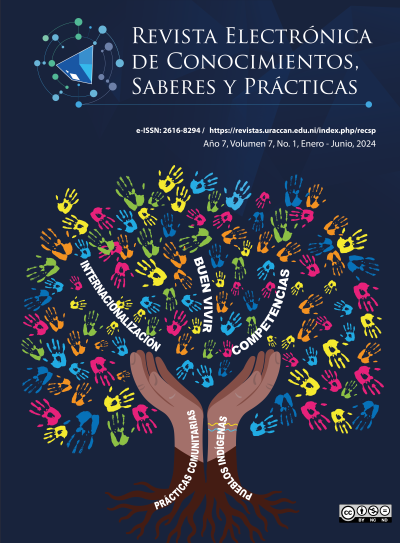Resignifying the fabric of Good Living of Intercultural Higher Education from Miskito communities, in the Nicaraguan Southern Caribbean
DOI:
https://doi.org/10.5377/recsp.v7i1.19372Keywords:
Good living, interculturality, worldviewAbstract
This harvest related to the Re-signified of Good Living in Intercultural Higher Education of Miskito communities in the South Caribbean of Nicaragua is based on a bibliographical review of a descriptive-exploratory nature to bring the reader closer to another perspective regarding Good Living, to understand the axiological dynamics of the indigenous vision and the positioning of the word.
A systematic review of articles was carried out, establishing as inclusion criteria; studies carried out between 2004 and 2023, which address the topic of interest, such as: Daniel Mato, Alberto Acosta, Mirna Cunningham, Emilse Castellón, Paulo Freire, José Garht, Ilenia García, Letisia Gómez, Eduardo Gudynas, Enrique Antileo, Fernando Huanacuni, Sebastián Levalle, Johan Méndez, Olga Molano, Alexander Ocaña, Camila Paz, Rosa Palacios, Fernando Pesántez, René Ramírez, Adriana Rodríguez, Verónica Mérida, José Saballos Velázquez, Fernando Yacasi Ccalluhuanca, María Santana, Inés Olivera Rodríguez and Fernando Sarango, among others. Likewise, documents that are part of the compendium of norms and policies of the University of the Autonomous Regions of the Nicaraguan Caribbean Coast (URACCAN) were reviewed, including the Institutional Educational Project and Pedagogical Model. The sources of information included databases such as Esbco, Scopus, and Google Scholar. The search strategies included the use of key terms.
Other legal and technical instruments were taken into account, such as the Political Constitution of Nicaragua, the General Education Law (Law 582), the Law on Official Use of the Languages of the Communities of the Atlantic Coast of Nicaragua (Law 162), as well as the Third Regional Conference on Higher Education (CRES, 2018), the United Nations Declaration on the Rights of Indigenous Peoples (2010), among other documents of interest, linked to education in general and higher education in particular and access by indigenous and Afro-descendant peoples, making an analysis from different contexts.
Downloads
219
resumen.mp3 (Español (España)) 90
abstract.mp3 (Español (España)) 97
Published
How to Cite
Issue
Section
License

This work is licensed under a Creative Commons Attribution-NonCommercial-NoDerivatives 4.0 International License.
At the moment in which a work is accepted for publication, it is understood that the author gives the Electronic Magazine of Knowledge and Practice (RECSP) exclusive rights of reproduction, distribution and sale of his manuscript for exploitation in all countries of the world in paper magazine format, as well as in any other magnetic, optical and digital media. The authors will also transfer to RECSP the rights of public communication for its dissemination and exploitation through Intranets, Internet and any wireless portals and devices decided by the publisher, by making available to users for online consultation of its content and its extract. , for printing on paper and / or for downloading and filing, all in the terms and conditions that appear on the website where the work is housed. In turn, the RECSP authorizes the authors of the works published in the journal to offer a copy of these works once published on their personal webs or in any open access repository. Together with this copy, a specific mention of the RECSP must be included, citing the year and the number of the journal in which the article or research note was published and adding, in addition, the link to the RECSP website.

